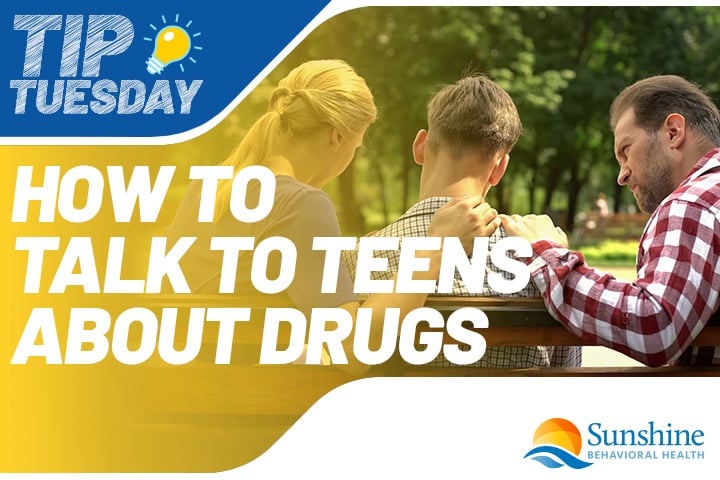
How To Talk About Drugs With A Teenager
Parenting doesn’t come with a handbook, and while some things come fairly easily, others, like talking to your teens about alcohol and drug abuse, can be challenging. While Red Ribbon Week is a great reminder to start a conversation with your kids about using drugs, it should only be the beginning. Not sure how to start? Consider these 5 tips to get you started:
1. Talk early—and often—about drugs. When our kids are young, we don’t consider that someday, they will get older and will most likely be exposed to peer pressure to try drugs or drinks. When you begin having a conversation about these behaviors early on, you’re helping your kids understand that it’s out there, and that trying these things can be harmful and that they don’t have to do it just because it seems like everyone else does.
2. Establish a relationship with your teen that encourages open, honest communication. They say communication goes both ways, and when your teen knows that they can talk to you about anything, no matter how scary it is, they will be much more likely to talk to you if there is an issue in his life. When it comes to drug or alcohol abuse, sometimes the way your teen knows how you will react can make all the difference in whether or not you can tackle behaviors before they become problematic. Try to be level-headed when your teen comes to you with problems and address them in a way that encourages trust. By showing them that you can work things out without being mad or getting them in trouble, you build a relationship that encourages even more honest communication.
3. Spend time with your teen—and their friends. While you probably won’t be able to get rid of the best friend that you just know is likely to cause trouble, you can try to offset potential drug and alcohol abuse behaviors by creating a place where your teen wants to be. You don’t have to always be with them, but you do have to let them know that you trust them enough to avoid using substances or drinking when they are out. When you’re spending time with your teen and their friends, you’ll also be able to identify the friends that might encourage these behaviors and talk to your kids privately about the potential while affirming that you trust your teen. Additionally, if something does happen, and your teen and their friends know that they can trust you, they will be much more likely to reach out if they need help.
4. Avoid saying negative things about people who have substance abuse issues. We don’t realize it, but when we tell our kids that people who use drugs and alcohol are “losers” or “bad people,” we can be making ourselves look judgmental to them. The same is true of telling your kids that they won’t be able to accomplish anything, make a decent living, or be a good person. Instead, focus on the harmful effects of substance abuse and how it can impact your teen’s life and health, both long- and short-term.
5. If you discover that your teen is abusing drugs or alcohol, don’t flip out. This is hard not to do, but in some cases, getting angry and yelling at your teen can make seeking treatment feel like they are being punished. Remember that many things can cause a kid to begin using or drinking, so one of the first things you as a parent should do is work to find out why your teen wants to abuse drugs or alcohol in the first place. Then, find a treatment program that will meet your teen’s needs and get them in it as soon as you can.
Ultimately, the most important thing you can do as a parent to help keep your teens from using drugs is to talk to them. Don’t wait until there is a crisis to start the conversation; talk about it often and openly so your kids know that they can come to you without worrying about getting in trouble.
Sources:
1. Redribbon.org – Red Ribbon Week
2. Drugfree.org – Connecting with Your Teen
3. Mayoclinic.org – Teen Drug Abuse: Help Your Teen Avoid Drugs
A Message From Our CEO
Medical disclaimer:
Sunshine Behavioral Health strives to help people who are facing substance abuse, addiction, mental health disorders, or a combination of these conditions. It does this by providing compassionate care and evidence-based content that addresses health, treatment, and recovery.
Licensed medical professionals review material we publish on our site. The material is not a substitute for qualified medical diagnoses, treatment, or advice. It should not be used to replace the suggestions of your personal physician or other health care professionals.






